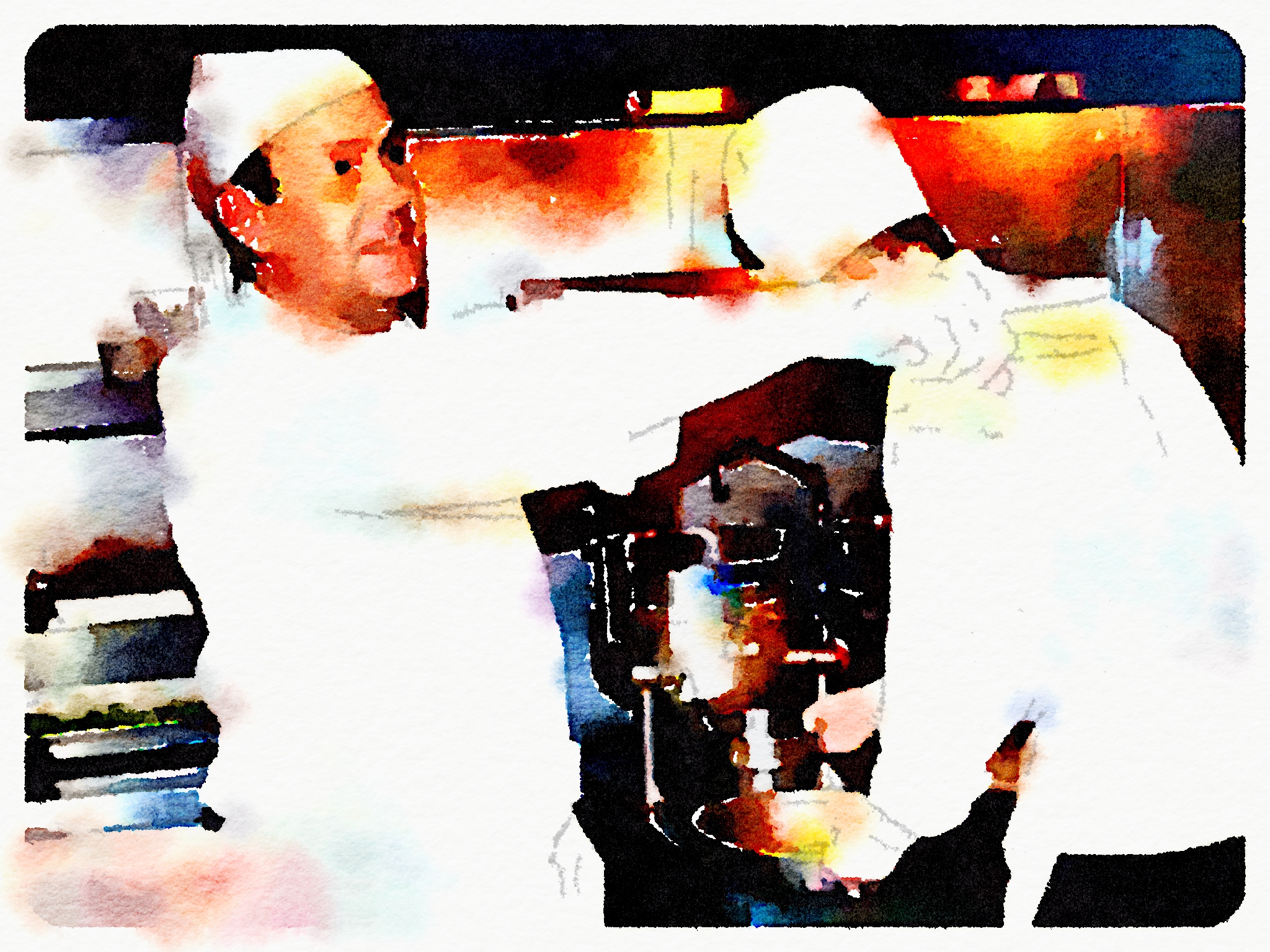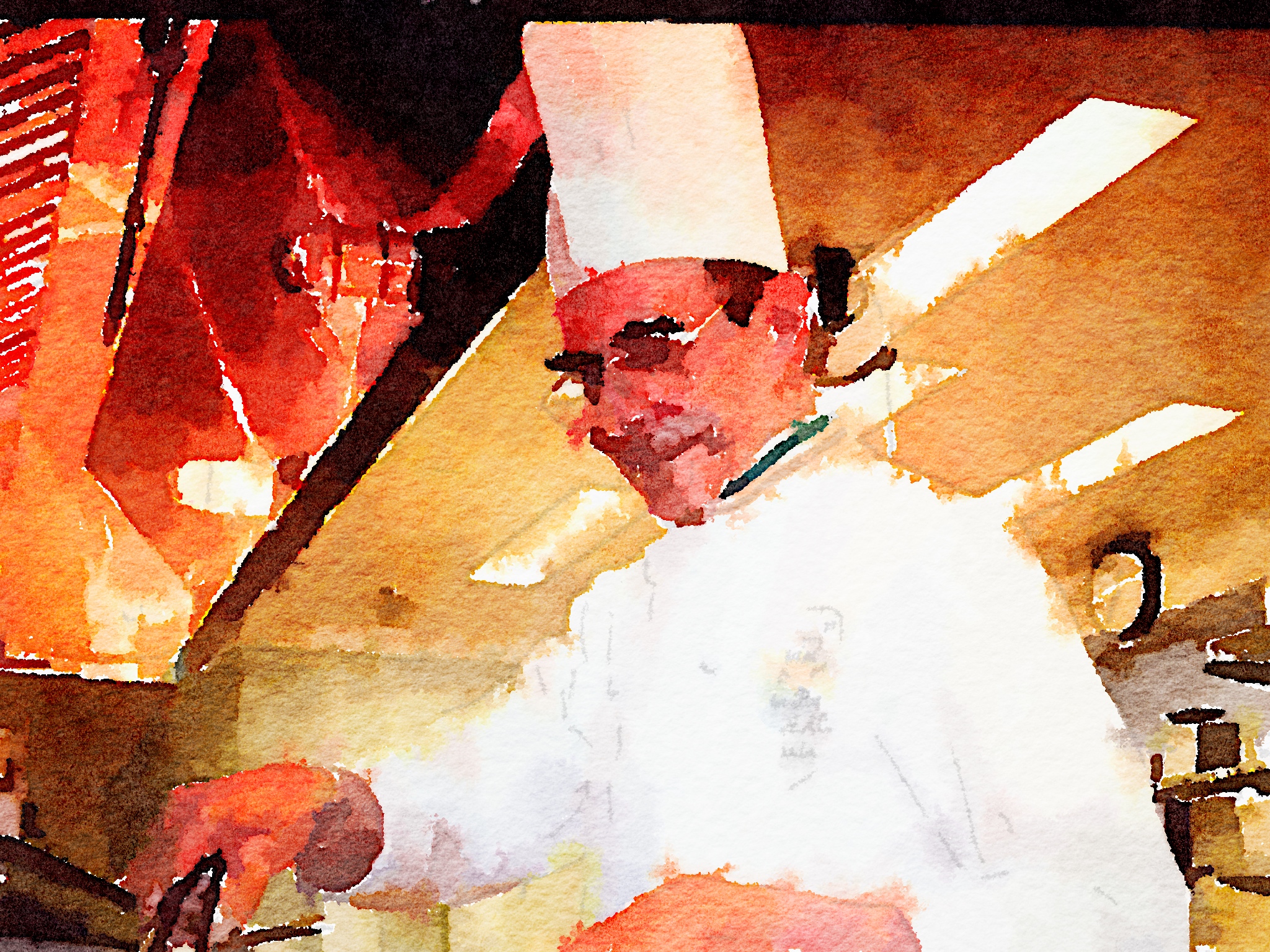
CHEF-to-CHEF,
So..you made it! As a property chef you have reached one of the pinnacles of your career – having paid your dues and likely worked very hard in a variety of properties until demonstrating the right mix of skill, knowledge, experience, and temperament to hold the lead position in a busy kitchen. Congratulations!
So..now what? With the title comes a basket full of new responsibilities and challenges that will likely weigh you down for years to come. It’s a damn hard job – one that is full of twists and turns, joys and sorrows, successes and failures, and even a handful of unexpected opportunities. The chef is not just the leader of the kitchen, he or she is the leader of people, and as such you must act the part – all of the time, day in and day out, and when you want to as well as when you don’t. These responsibilities come with the job – embrace them.
As a leader of people – you have an opportunity, and to some degree – a responsibility to help to mold your staff into not just competent cooks, but also productive, successful, and happy members of society. It is an opportunity to “pay forward”, recognizing that your success rests on the shoulders of many – now it is your turn to do the same. It is also, from a self-serving standpoint, an opportunity and a responsibility to take on this role in an effort to attract, inspire, and retain a competent team.
The most effective teams are made up of people who are dependable, willing to learn, focused on doing their jobs well, supportive of their peers, and happy both on the job and when they are not. So, what can be done? What are your opportunities? Where can you begin to “pay forward” and help to mold those who call you “chef”?
If we begin with some basic understandings that a competent, happy, and confident team member is one who is physically, mentally, emotionally, and even spiritually healthy –then the following list of opportunities could easily apply to your new job description:
[] EXERCISE AND HEALTH:
One of the greatest gifts that you can offer another human being is a path towards better health and wellbeing. Do we (chefs) have any obligation to guide staff members towards this goal? A healthy employee is an energized employee, an employee who feels good about themselves, and this will, without a doubt, impact their work and their engagement with the rest of the team. Guiding individuals towards better health through exercise, at any level, is self-gratifying as you begin to witness the changes that take place in each engaged individual.
Be an advocate within your restaurant for a benefit package that includes exercise. Instead of those shift drinks and a small end of year bonus – arrange for employee memberships at a local gym. Offer a weekly yoga class for your employees, sponsor employee involvement in local 5K runs or power walks. Convince your restaurant to organize a softball or pick-up basketball team, or even install a few pieces of weight training equipment in the basement of your business. Anything that gets your employees to work those muscles, stretch those limbs, and breathe in some fresh air will pay back tenfold.
[] DIET AND HEALTH:
Cooks notoriously eat poorly (at least at work). Unlike the passion they may show for the food they prepare for guests – food to a cook is oftentimes viewed as quick fuel to help them push through another service. It is common to see a less than inspiring staff meal consumed while standing up and leaning over a garbage can or picking at a few pommes frites or cookies from the pastry department.
As a chef – your commitment to staff meal is a true opportunity to set the tone for service, engage your staff in a moment of conversation and mutual appreciation for good food, and help create a pattern of good nutrition that can define a commitment to good health. Make those staff meals a celebration of this, a celebration of food, a celebration of staff as family, and a celebration of the relationship that well prepared food and the time to enjoy it has on body, mind, and soul. As chefs we are the gatekeepers for educating everyone about the relationship that food has to health.
[] FINANCIAL MANAGEMENT:
We all understand that there is a problem with the work done by seasoned professional cooks and the amount of money and benefits that restaurants offer for this work. We need to collectively work on this issue and find a fair solution. At the same time, many of these individuals have a real difficult time managing their limited resources and planning for the future.
As a person who has worked through this and risen to the position of chef, it is likely that you are in a much better financial position than your staff. Offering them advice, helping them budget their funds, and finding resources for them to address their financial concerns is another opportunity for you to invest in your staff and give them a reason to relish where they work.
[] EDUCATION:
Employee retention happens if staff members are compelled to stay because the employer invests in them. The best thing that you can do for your cooks is to consistently work at making them better at their job. When their skill set and knowledge base improve then so does their worth and their personal brand. Yes – a well-trained and educated employee has the ability to move elsewhere, but that is what makes you and your restaurant attractive to a steady stream of new cooks.
The best chefs invest in a cook’s in-house education, and even help those same employees find ways to engage in a formal education. Take pride in building exceptional cooks through your active support.
[] MEMBERSHIP:
Some may find membership in organizations to be ineffective and un-necessary, but I have always found that there is much to gain from feeling a part of something larger than what an employee does day in and day out. Camaraderie, structure, representation, an opportunity to build a network of professionals and mentors, and the chance to validate one’s own skills is paramount to building pride.
Committed chefs and restaurants recognize this and support a cook’s interest in membership in organizations like The Chef’s Collaborative, Slow Food, The American Culinary Federation, Women Chefs and Restaurateurs, and The National Restaurant Association.

[] DISCIPLINE IN LIFE:
Begin by understanding that most people actually respond well to standards, organization, and the discipline to be consistent, professional and to complete tasks correctly. Part of an education for life that you can offer cooks is to hold them to the highest standards, be consistent, and set the example in this regard. Whether it is how they look, act and interact, approach their tools, follow through with proper methods, or assemble a plate of food for the pass – discipline leads to great results and a way of approaching any job that they do for you or others.
[] THE POWER OF MUSIC, ART, AND HISTORY:
A balanced cook is a person who has the opportunity to be exposed to the inspiration and healing nature of art in all forms. Talk with your cooks about music, physical artists, great books, and the history behind the profession of culinary arts. It is important to their outlook on life.

[] PROFESSIONALISM:
Grooming, uniform, respect for others, dependability, work ethic, honesty, cost consciousness, and respect for the ingredients that cooks work with – the best cooks approach their craft as consummate professionals. As a leader and a mentor you owe it to your employees to show them what professionalism means, how it is applied, and why it is important to the operation and to their brand.
[] CAREER MENTORSHIP:
Every career cook needs a person who is willing to serve as his or her mentor. Be the person who guides the cook along, points out his or her errors in performance and shows them how to improve, the person who will offer honest critique and be there to provide advice when requested. Be the leader who is willing to listen and not judge, but point out their errors in judgment. Be the chef who is always there (even after they leave your employ) to answer the phone and take the time to be that guide on the side. This is the kind of chef that people want to work for.

[] CONFIDENCE BUILDING:
When you engage in all of the above a cook’s confidence will grow, his or her pride in the profession will increase exponentially, the ability to perform at consistent peak levels will result, and their allegiance to you and the restaurant will help to create effective ambassadors for the future of the restaurant.
PLAN BETTER – TRAIN HARDER
BE THAT GUIDE ON THE SIDE
Harvest America Ventures, LLC
Restaurant Consulting and Training
www.harvestamericacues.com BLOG

Leave a comment